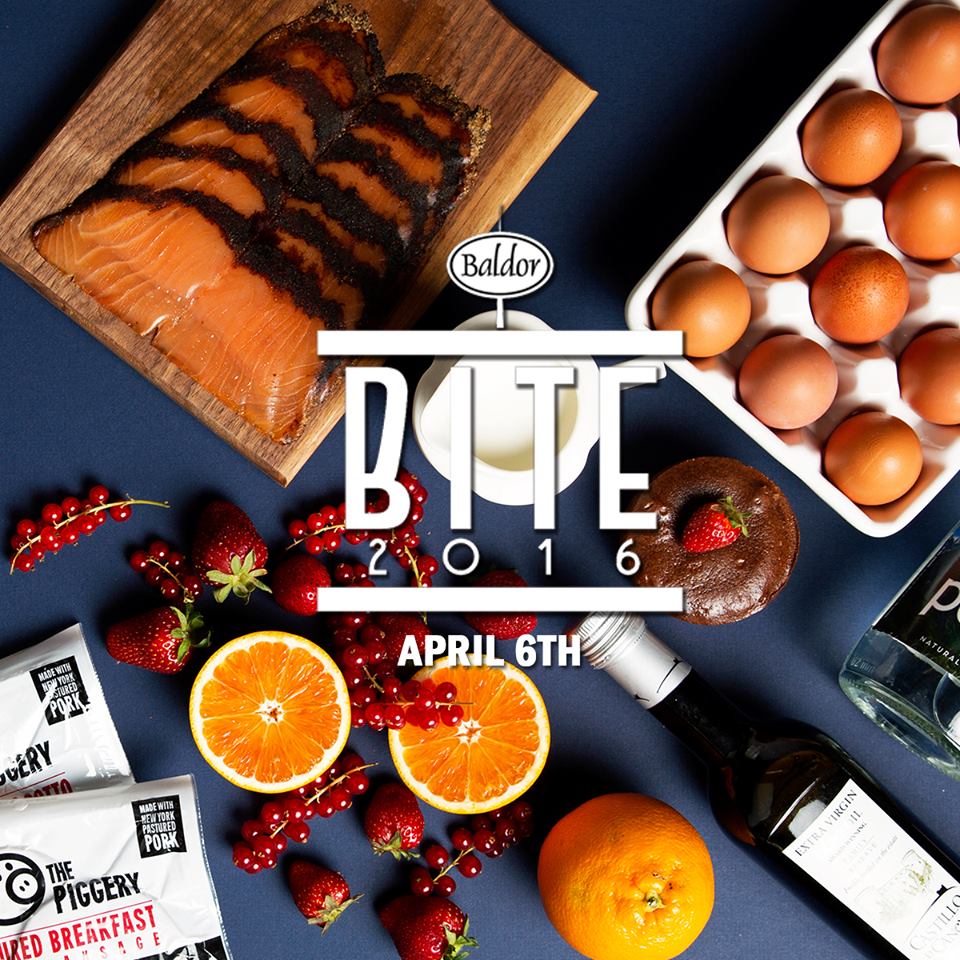https://www.instagram.com/p/BD4OhOnNQRS/
Imagine if the colorful array of the New York Produce Show and Conference were to meet the Summer Fancy Food Show, but with way less cheese. Last week’s BaldorBite was something like this with gorgeous piles of green leaves, bright-orange orbs, apples for days and almost every kind of cured meat you could imagine. The event brought together dozens of Baldor Specialty Foods’ suppliers and customers for a one-day party to celebrate the company’s 25th anniversary.
In 1946, Baldor was a fruit stand in Greenwich Village called Balducci’s (according to their website, James Beard was a longtime client). As they’ve evolved over the years, Baldor has kept their focus on careful sourcing, and their lengthy client roster is a good example of their reach. They’re one of the largest food importers and distributors in the Northeast and Mid-Atlantic regions with over 8,000 accounts, and they’re committed to sourcing locally at scale.
BaldorBite was hardly a tasting trade show, though. They also had a top-notch speaker lineup that included Claus Meyer, who was an early investor in Noma before opening Gustu, a high-end restaurant in Bolivia that trains low-income residents to work in the kitchen. Now Meyer has moved to Manhattan and, through his philanthropic organization Melting Pot, is now working on a school and restaurant project in Brownsville, Brooklyn.
The passionate European preaches beyond the exclusive tiers of fine dining and Nomadic foraging. “Can you combat poverty with deliciousness?” he asked the crowd. “Food matters beyond pleasure,” he asserted.
After a conversation about how Instagram changes the way we dine, the day’s host Jordana Rothman discussed innovation in the restaurant industry with Richard Coraine, chief development officer at Union Square Hospitality Group. Coraine pointed out that “innovation doesn’t have to be a dramatic act,” and shared the Shake Shack story as an example. Twelve years ago, they were approached to place a kiosk in a Madison Square Park. From the beginning of the project, Danny Meyer insisted that:
- It has to be a magnet for the community. They have to draw people here because it’s a world-class park.
- They have to enrich this park. They want to make this neighborhood better.
- It has to be quick. People won’t wait in line in a park unless it’s quick.
So the team dreamed up a hot dog cart. Yes, a hot dog cart. According to Coraine:
The first day we were going to serve 200 hot dogs and 100 hamburgers. Our first order was from an intern from the trading floor of Credit Suisse bank and it was for 24 hamburgers. But we didn’t plan for that. We got into the hot dog and ice cream business. I could only get 12 on the griddle at a time. A line started. We ran out of burgers by 12:15 p.m. We weren’t trying to disrupt anything. The line was good. Everyone in line said, ‘This burger must be great, they’re sold out!’
https://www.instagram.com/p/BD4ZmA1r8TM/
Coraine referred to it as the subtlety of innovation, but judging by Union Square Hospitality’s many successes, you could also call it accidental innovation that benefited from a team good enough to listen to the cues. “You have to be confident and know what your DNA is,” said Coraine. “What should stay and what has to evolve.”
The room was packed for the final talk with Will Guidara of Make It Nice Hospitality, Eleven Madison Park and The NoMad Hotel; Ahmass Fakahanny, CEO of Altamarea Group; and John Fraser, chef/owner of Dovetail, Narcissa and Nix. They discussed the future of fine dining and specifically the rise of “fast casual,” or quick service restaurant (QSR), an industry name for the burgeoning category that includes Sweetgreen, Dig Inn, Chipotle and Five Guys among others.
As more restaurateurs develop brands that are accessible to different income levels and the quality of product becomes easier to source, the space is opening up a slew of new options. Guidara and his partner, chef Daniel Humm, will soon be entering the QSR space with Made Nice, a new restaurant next to the NoMad bar. It’s a location that will “augment the other,” Guidara said. Fakahanny echoed this thought. “Fast casual complements our fine dining,” he said. “We can rotate our employees throughout the business…. It’s nice to have [this option as] an occasional meal—food with a different temperament.”
https://www.instagram.com/p/BD306GiL8Vi/
Fraser, who recently opened vegetarian restaurant Nix, made an analogy to doing your hair and then messing it up (something I never do). “We’re using the same onion, the same side of beef, the same cooks, but they’re choosing to work that way, and we’re choosing to serve the onion one way in one place. It’s no longer an accident. I think it’s been replaced with people that choose to be casual instead of by accident becoming casual,” he said.
The crowd wondered if the panelists felt that one restaurant would cannibalize the other. Guidara’s response: “I do think a lot of the time they’re the same customer. I love going to Shake Shack, and I love going to Le Bernardin. I think as long as they’re operating on the same cultural foundation, I don’t think they diminish the values of the other.”
The day wrapped with a Who’s Who of chefs dishing up bites for the crowd (Speedy Romeo, Wildair, Tacombi and more), live music and cocktails. On the way out I noticed that all the tabletops had been gleaned empty. With a head full of stories, my backpack was stuffed with unripe avocados, pink grapefruits and sumo citrus.



